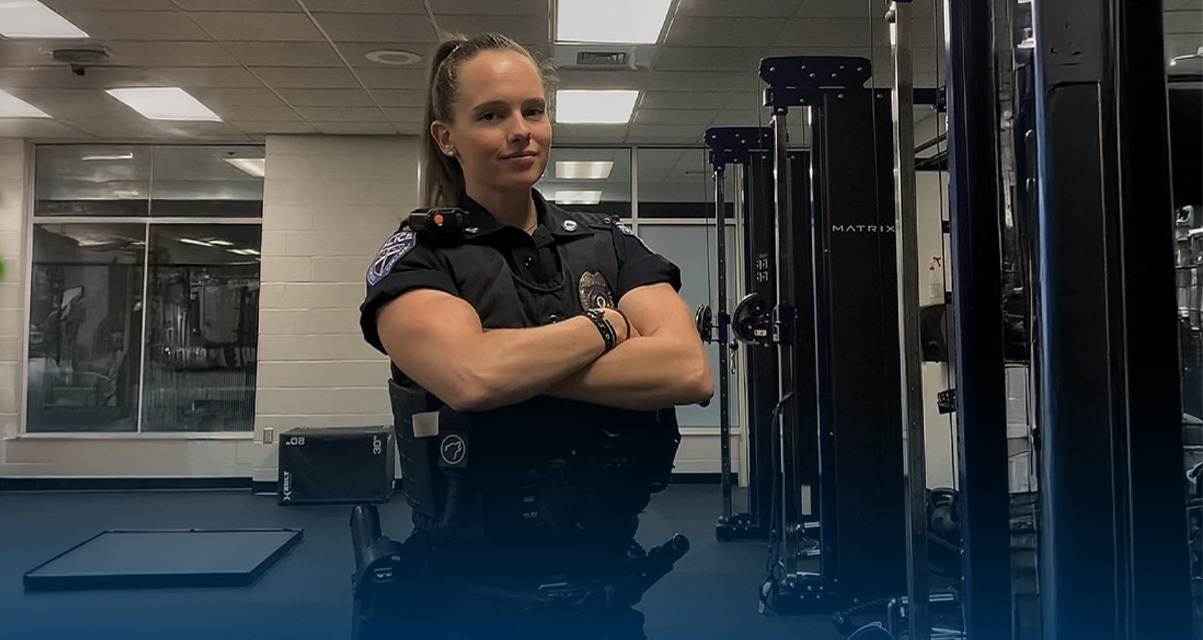Women in Law Enforcement: Meredith Kercher ’19 on Leading with Empathy
Meredith Kercher ’19, who studied recreation sports and wellness as a student, is now a campus police officer at Gordon College. We sat down with her to ask about what life is like as a woman and a Christian in law enforcement.
What made you decide to pursue a career in law enforcement?
My journey in law enforcement started when I was a personal trainer. Two clients took me on because they wanted to be police officers, and one of the law enforcement qualifications is passing several intense fitness tests. While training them I realized that the core of what I had always wanted to do was serve others. I thought about my grandfather, who served in World War II, saying that serving your country and community by selflessly laying down your life for others reflects how Jesus calls us to love others. I felt the Holy Spirit calling me to take a leap of faith and enter the world of law enforcement, so I listened.
What’s an average day like as a campus police officer?
On the days I’m on the day shift, I’m on duty at 7 a.m. The overnight officer and I switch, and they debrief me on what happened during the night and anything I should follow up on, and I check the patrol log. I check in with our dispatchers, both our on-campus student worker and our out-of-state contact. I do a cruiser check, then look over all the equipment and weapons.
Once that’s done I like to do a standard outer-campus patrol to check on exterior areas. I often go to the Chapel to check on the building and keep it secure. I say hi to students and try to make connections with them. In the afternoon I go over to Gordon-Conwell Theological Seminary and do a standard patrol there too, along with motor vehicle enforcement. It’s a way of putting the face of Gordon Police (GoPo) out there; since our road is a main one coming off the highway, having police present is a general deterrence of off-campus crime. As an officer at a college, I communicate a LOT with the college administration about what I’m doing, whereas town or state officers don’t have as much oversight.
If there are no incidents, I get out of the cruiser, walk around and say hi to people on both campuses. Mostly I get a lot of service calls, opening offices or classrooms for professors or employees who forgot keys. But sometimes bigger incidents do happen, anything from animal control to actual investigations. At times we get a regional “be on the lookout (BOLO)” from the state for criminals in the area.
What happens when someone doesn’t perceive you as safe, due to their perceptions about policing?
I respect the fact that to some people, my presence alone might be intimidating. As a police officer I wear a badge that represents not only Gordon, but all cops. If one officer makes a bad decision, it affects every officer in America. Before I make any decision, I have to consider, “How does this represent Gordon, or police officers or me personally?” My purpose is to be a calming presence, to present the best version of what law enforcement is intended to be.
GoPo intentionally interacts with people as much as possible outside of official police dealings. Our main focus is building relationships first, especially in the beginning of each school year. On move-in day we lead from the front as a welcoming presence; we’re the first friendly face families see. Cops have a slightly better reputation in Massachusetts, thanks to the very high standards and resources the state has, but students coming from other states that may not have good state cops may have a bias towards us, so we try to make a fresh start in their new home.
Ultimately, we’re here to protect and serve students. I take every chance to have a good interaction with students, especially since they may have to call me when they’re having a bad day, and sometimes they want to take it out on someone. But it’s my job to respond with empathy and grace. Some people are harder to serve than others, but that’s what Jesus did.
What’s it like being a woman in the male-dominated industry of law enforcement?
There’s a stigma. Women police officers have to work ten times harder than men, especially with the physical aspects of the job. I’m very grateful for my background in martial arts and fitness because I can hold my own, but my biology is against me. Female officers have to be more tactical and strategic, finding the weak points in an attacker instead of using brute force.
Campus officers don’t often work together, but since I’m the only woman at GoPo, usually people will look to my male co-officer first as the one that’s in charge. I’ve learned I can’t take that personally. As a woman I can help other women in the community. For example, it’s hard for women to talk to a male cop about things such as assault or intimate medical issues. That’s where I can use my empathetic and nurturing side, which is definitely my leadership style, to listen and help.
 The Bell
The Bell